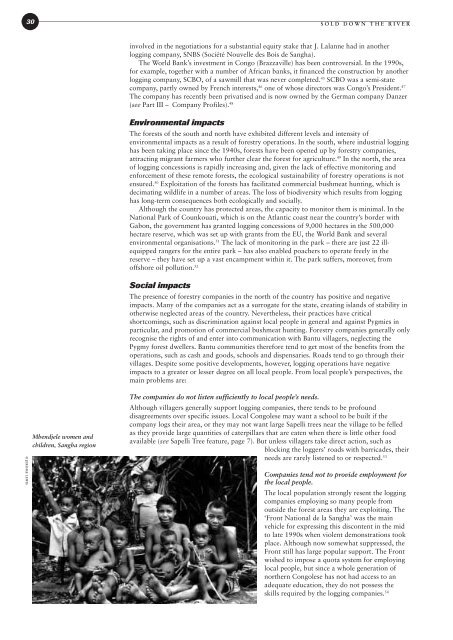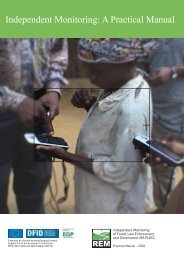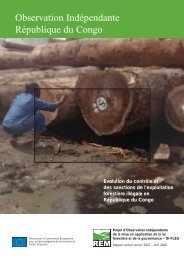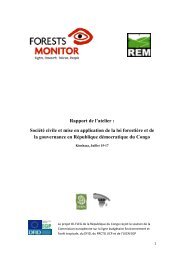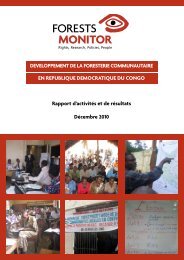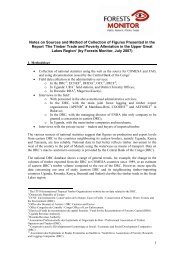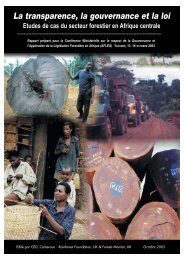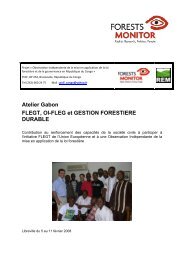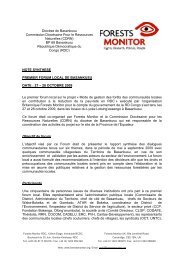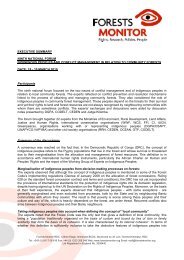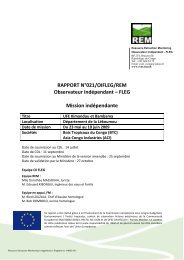Sold down the river - Salva le Foreste
Sold down the river - Salva le Foreste
Sold down the river - Salva le Foreste
You also want an ePaper? Increase the reach of your titles
YUMPU automatically turns print PDFs into web optimized ePapers that Google loves.
30SOLD DOWN THE RIVERinvolved in <strong>the</strong> negotiations for a substantial equity stake that J. Lalanne had in ano<strong>the</strong>rlogging company, SNBS (Société Nouvel<strong>le</strong> des Bois de Sangha).The World Bank’s investment in Congo (Brazzavil<strong>le</strong>) has been controversial. In <strong>the</strong> 1990s,for examp<strong>le</strong>, toge<strong>the</strong>r with a number of African banks, it financed <strong>the</strong> construction by ano<strong>the</strong>rlogging company, SCBO, of a sawmill that was never comp<strong>le</strong>ted. 45 SCBO was a semi-statecompany, partly owned by French interests, 46 one of whose directors was Congo’s President. 47The company has recently been privatised and is now owned by <strong>the</strong> German company Danzer(see Part III – Company Profi<strong>le</strong>s). 48Environmental impactsThe forests of <strong>the</strong> south and north have exhibited different <strong>le</strong>vels and intensity ofenvironmental impacts as a result of forestry operations. In <strong>the</strong> south, where industrial logginghas been taking place since <strong>the</strong> 1940s, forests have been opened up by forestry companies,attracting migrant farmers who fur<strong>the</strong>r c<strong>le</strong>ar <strong>the</strong> forest for agriculture. 49 In <strong>the</strong> north, <strong>the</strong> areaof logging concessions is rapidly increasing and, given <strong>the</strong> lack of effective monitoring andenforcement of <strong>the</strong>se remote forests, <strong>the</strong> ecological sustainability of forestry operations is notensured. 50 Exploitation of <strong>the</strong> forests has facilitated commercial bushmeat hunting, which isdecimating wildlife in a number of areas. The loss of biodiversity which results from logginghas long-term consequences both ecologically and socially.Although <strong>the</strong> country has protected areas, <strong>the</strong> capacity to monitor <strong>the</strong>m is minimal. In <strong>the</strong>National Park of Counkouati, which is on <strong>the</strong> Atlantic coast near <strong>the</strong> country’s border withGabon, <strong>the</strong> government has granted logging concessions of 9,000 hectares in <strong>the</strong> 500,000hectare reserve, which was set up with grants from <strong>the</strong> EU, <strong>the</strong> World Bank and severa<strong>le</strong>nvironmental organisations. 51 The lack of monitoring in <strong>the</strong> park – <strong>the</strong>re are just 22 il<strong>le</strong>quippedrangers for <strong>the</strong> entire park – has also enab<strong>le</strong>d poachers to operate freely in <strong>the</strong>reserve – <strong>the</strong>y have set up a vast encampment within it. The park suffers, moreover, fromoffshore oil pollution. 52Social impactsThe presence of forestry companies in <strong>the</strong> north of <strong>the</strong> country has positive and negativeimpacts. Many of <strong>the</strong> companies act as a surrogate for <strong>the</strong> state, creating islands of stability ino<strong>the</strong>rwise neg<strong>le</strong>cted areas of <strong>the</strong> country. Never<strong>the</strong><strong>le</strong>ss, <strong>the</strong>ir practices have criticalshortcomings, such as discrimination against local peop<strong>le</strong> in general and against Pygmies inparticular, and promotion of commercial bushmeat hunting. Forestry companies generally onlyrecognise <strong>the</strong> rights of and enter into communication with Bantu villagers, neg<strong>le</strong>cting <strong>the</strong>Pygmy forest dwel<strong>le</strong>rs. Bantu communities <strong>the</strong>refore tend to get most of <strong>the</strong> benefits from <strong>the</strong>operations, such as cash and goods, schools and dispensaries. Roads tend to go through <strong>the</strong>irvillages. Despite some positive developments, however, logging operations have negativeimpacts to a greater or <strong>le</strong>sser degree on all local peop<strong>le</strong>. From local peop<strong>le</strong>’s perspectives, <strong>the</strong>main prob<strong>le</strong>ms are:© JEROME LEWISMbendje<strong>le</strong> women andchildren, Sangha regionThe companies do not listen sufficiently to local peop<strong>le</strong>’s needs.Although villagers generally support logging companies, <strong>the</strong>re tends to be profounddisagreements over specific issues. Local Congo<strong>le</strong>se may want a school to be built if <strong>the</strong>company logs <strong>the</strong>ir area, or <strong>the</strong>y may not want large Sapelli trees near <strong>the</strong> village to be fel<strong>le</strong>das <strong>the</strong>y provide large quantities of caterpillars that are eaten when <strong>the</strong>re is litt<strong>le</strong> o<strong>the</strong>r foodavailab<strong>le</strong> (see Sapelli Tree feature, page 7). But un<strong>le</strong>ss villagers take direct action, such asblocking <strong>the</strong> loggers’ roads with barricades, <strong>the</strong>irneeds are rarely listened to or respected. 53Companies tend not to provide employment for<strong>the</strong> local peop<strong>le</strong>.The local population strongly resent <strong>the</strong> loggingcompanies employing so many peop<strong>le</strong> fromoutside <strong>the</strong> forest areas <strong>the</strong>y are exploiting. The‘Front National de la Sangha’ was <strong>the</strong> mainvehic<strong>le</strong> for expressing this discontent in <strong>the</strong> midto late 1990s when vio<strong>le</strong>nt demonstrations tookplace. Although now somewhat suppressed, <strong>the</strong>Front still has large popular support. The Frontwished to impose a quota system for employinglocal peop<strong>le</strong>, but since a who<strong>le</strong> generation ofnor<strong>the</strong>rn Congo<strong>le</strong>se has not had access to anadequate education, <strong>the</strong>y do not possess <strong>the</strong>skills required by <strong>the</strong> logging companies. 54


